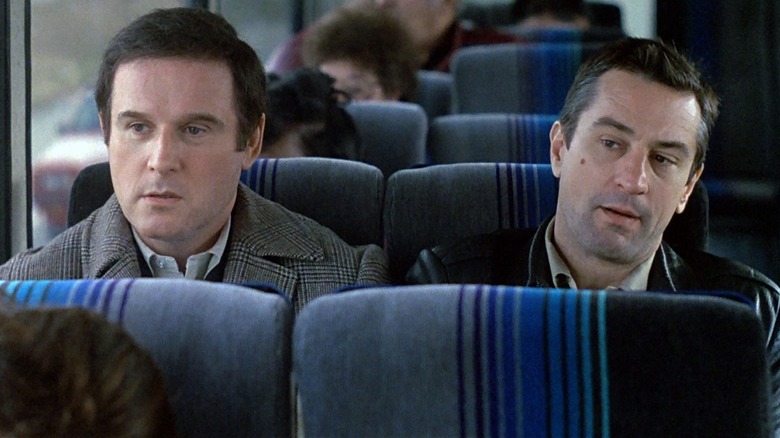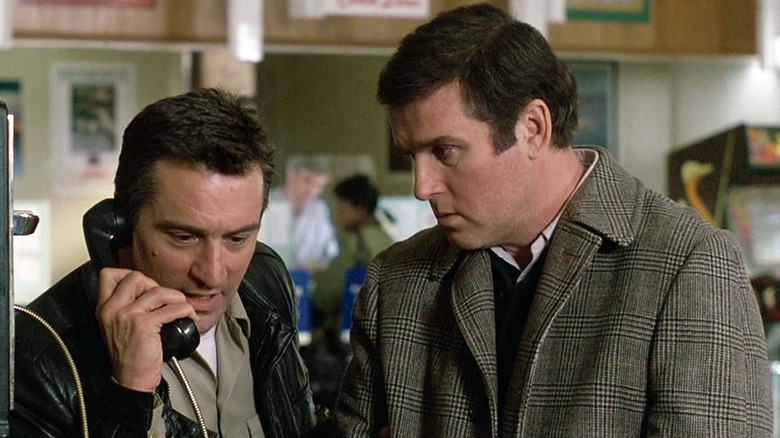The Daily Stream: Midnight Run Is A Reminder That Buddy Comedies Can Bring More Than Just Laughs
(Welcome to The Daily Stream, an ongoing series in which the /Film team shares what they've been watching, why it's worth checking out, and where you can stream it.)
The Movie: "Midnight Run"
Where You Can Stream It: Netflix
The Pitch: Robert De Niro and Charles Grodin bickering and getting on each other's nerves for every second they spent together on a week-long "midnight run" from New York to Los Angeles. Seriously, this movie should completely sell newcomers on that premise alone. De Niro stars as Jack Walsh, a cop-turned-bounty hunter who seems to be in the business for the money, the freedom from consequences, the violence, and little else. Grodin plays his polar opposite: Jonathan "The Duke" Mardukas, an unassuming accountant who's wanted by a bail bondsman (Joe Pantoliano), the feds (led by Yaphet Kotto's Agent Alonzo Mosely), and a pesky rival bounty hunter named Marvin Dorfler (John Ashton) for embezzling millions of dollars from the Chicago crime lord Jimmy Serrano (Dennis Farina) and sending most of that cash away to charity. Nothing about their backstories or personalities make the two good bedfellows on a journey spanning the uncomfortably close confines of planes, trains, and automobiles (yup, you bet I just went there) ... but, of course, that's precisely what makes them such an ideal pairing in the first place, their volatile chemistry serving as the crucial linchpin on this buddy comedy that aspires to be so much more than that.
Why It's Essential Viewing
Hypothetically, there could probably be an alternate version of "Midnight Run" that takes a much darker tone, taking all of its admittedly seedy events and filtering them through a more cynical crime/thriller lens. That's probably how it would've been pitched and sold today (assuming it ever even got to that point in the process, of course), but thankfully that's not the direction that the film takes.
Director Martin Brest ("Beverly Hills Cop," "Scent of a Woman," "Meet Joe Black," and, uh, "Gigli"?) works from a script by George Gallo ("Bad Boys," "Middle Men," "The Whole Ten Yards") to infuse the violence and grime of this shady business with a lighthearted and oftentimes hilarious touch. Unlike so many movies in recent years that seem to think they must abide by one single tone throughout the entire run time in order to inspire a sense of realism and self-seriousness, "Midnight Run" throws caution to the wind and dares audiences to keep up as it smoothly jumps from mobsters slinging bone-chilling death threats, classical '80s action sequences that maybe go a bit too over-the-top in places, the constantly uproarious infighting between Jack and the Duke, and emotionally-packed moments that sneak up on viewers and hit like a head-on collision.
At the behest of Pantoliano's slimy bailsman, Eddie Moscone, Jack is sent to track down the Duke and wrangle him all the way back to Los Angeles for processing and jail time ... if the vengeful Serrano doesn't get to him first, that is. Almost immediately, the Duke threatens to be a handful as his deadpan sarcasm, insufferably nosy intrusions into murky Jack's pre-bounty hunter past ("Why are you unpopular with the Chicago Police Department?"), and apparent fear of flying derails Jack's plans again and again, forcing him to go to increasingly frantic lengths just to meet his deadline, get his money, and send off the Duke to an inevitable death before his conscience catches up to him.
That, interestingly enough, is what separates "Midnight Run" from so many other pretenders: the film, just like both leads, actually has a conscience.
That doesn't mean that it plays like a preachy or moralizing exercise that strips the fun out of watching flawed characters do immoral and often criminal things. It simply means that beneath all the antics is a beating heart, one that rises to the fore every now and then to ground everything in real emotion and genuine psychology. Jack's way of life wasn't a choice he made by accident, a fact that becomes clearer to the ever-inquisitive Duke as the story moves forward. A brief visit to Jack's estranged wife and daughter about midway through the film might've come across as a lazy detour elsewhere, but instead hits with the full force of repressed feelings and past regrets. With the Duke standing by as a passive (but amused) observer to all of this, a marked change comes over his dynamic with Jack that encourages viewers to wonder just how well these two might have gotten along in different circumstances. "You and I ... probably would've still hated each other," Grodin delivers with flawless comedic timing, but it's obvious from Jack's resulting laughter that the two recognize the growing bond between them.
"Midnight Run" is just one of many '80s buddy movies that put all its eggs in one basket by asking audiences to become invested in the two leading stars. Some of the best moments take place in the quiet moments between Jack and the Duke; handcuffed, sitting at a bar and looking forlornly at chorizos with eggs; hitching a ride on a cargo freight train, where Jack finally talks openly about what went wrong with his marriage and his former job as a Chicago cop; the final parting between Jack and the Duke, an unexpectedly heavy moment that ties together the rest of the movie beautifully.
"Midnight Run" can be enjoyed on many levels, but the most rewarding viewings benefit from opening yourself up to it just as the stubbornly closed-off Jack eventually does. There isn't a trace of self-doubt, embarrassment, or cynicism here. "Midnight Run" takes just a hair over two hours to take audiences on their own ride and convincingly show us how these two individuals, who couldn't be more different from each other, might actually want to see each other in the next life.

